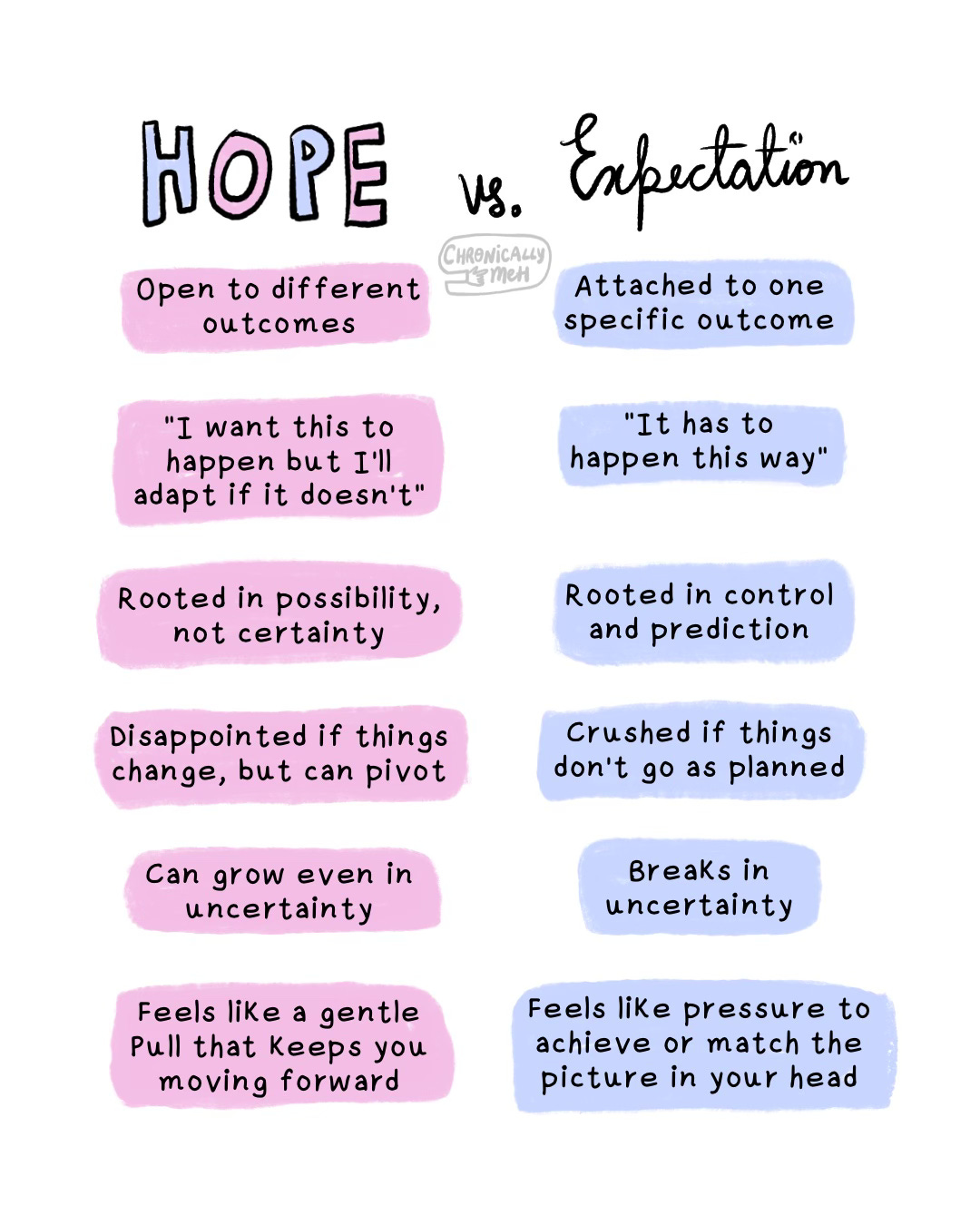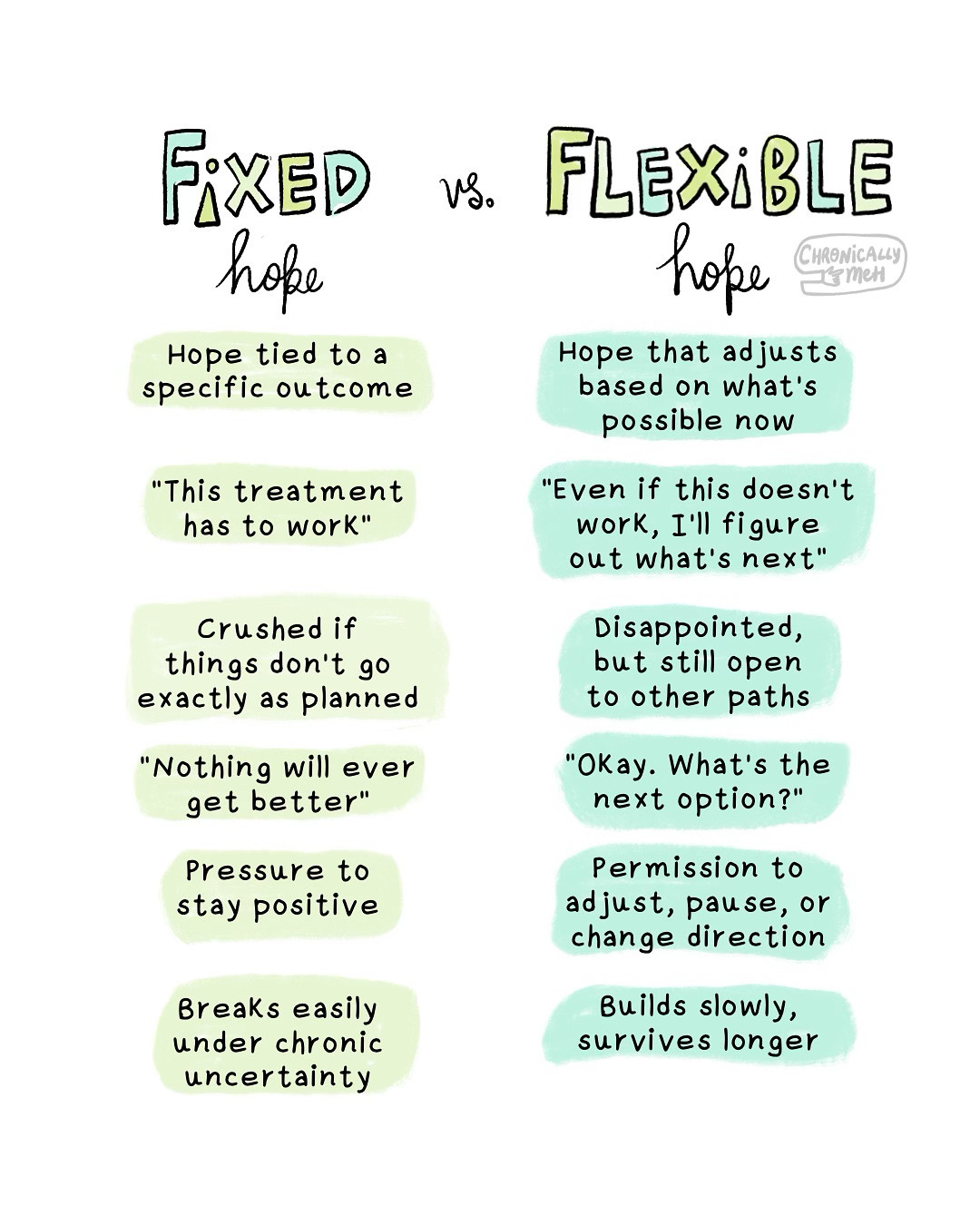The difference between hope and expectation
And why one hurts more
I used to think hope and expectation were the same thing. That they’re just two words for “really wanting things to work out.” They’re not.
Hope is lighter. You can carry it without it weighing down your next step. It’s the quiet “maybe” you keep in your pocket.
Expectation is heavier. You reorganize your whole week around it. You start writing the ending before you’ve lived the middle.
In invisible illness, I’ve found that hope can make things softer. Expectation can make them brutal.
How are they different?
Hope is a desire with room for uncertainty. You believe something good could happen, but you know other outcomes are possible.
Hope acknowledges uncertainty as a fundamental part of the human experience. It doesn't demand guarantees. It doesn't throw tantrums when things don't go according to plan. Hope is that friend who encourages you to try out for the school play while also helping you brainstorm other creative outlets, just in case.
Expectation is a belief accompanied by a plan. You decide in advance what should happen and feel cheated when it doesn’t.
Expectations feel safer than hope because they give us the illusion of control. They let us plan, prepare, and mentally inhabit a future that hasn't arrived yet. But this safety is a mirage. The more tightly we hold our expectations, the more devastating it becomes when reality doesn't cooperate.
Disappointment from unmet expectations hits harder because you’ve already emotionally spent the outcome before you got it.
The tricky part is that you might think you're hoping when you're really expecting.
Sometimes what we call "hope" is really just expectation wearing different clothes. I think of it as fixed hope versus flexible hope. So this next graphic will seem very similar to the one above.
How to hold onto hope without letting expectation crush you
(AKA, how to keep the door open without building the whole house)
1. Set hopes in “maybes,” not “musts.”
Instead of: This appointment will give me a diagnosis.
Try: This appointment might bring me closer to answers.
Your brain will still lean toward optimism, but you’re not locking yourself into a single acceptable result.
2. Keep your plans neutral until the outcome is real.
Don’t book extra events or make changes to your life based solely on an anticipated improvement. Wait until you have the results in your hands (or the symptom change in your body).
3. Name the other possible endings.
Write down two or three alternative ways the situation could go (emotional cushioning). If one of them comes true, you’ve already made mental space for it.
4. Anchor to what you can control.
You can control: how you describe your symptoms, how you prepare for an appointment, how you rest after.
You can’t control: how a provider responds, whether a treatment works, how long a waitlist is.
Put more mental energy into the first list.
5. Have a “post-outcome plan” ready for either scenario.
If it goes well → celebrate in a way that’s sustainable (not by overexerting yourself).
If it doesn’t → have a comfort plan already in place (your show, your food, your person to vent to). This keeps the emotional drop from feeling bottomless.
This has changed the impact of everyday uncertainties, especially with things that are never in my control to begin with.
It’s allowed me to hope even when things feel hopeless. It reminds me that there’s always something to look forward to.
I’d rather put my energy into something that uplifts me. Wouldn’t you?





In the 12 step world, we often say that an expectation is a premeditated resentment. Thanks for a beautiful articulation of why that's so true.